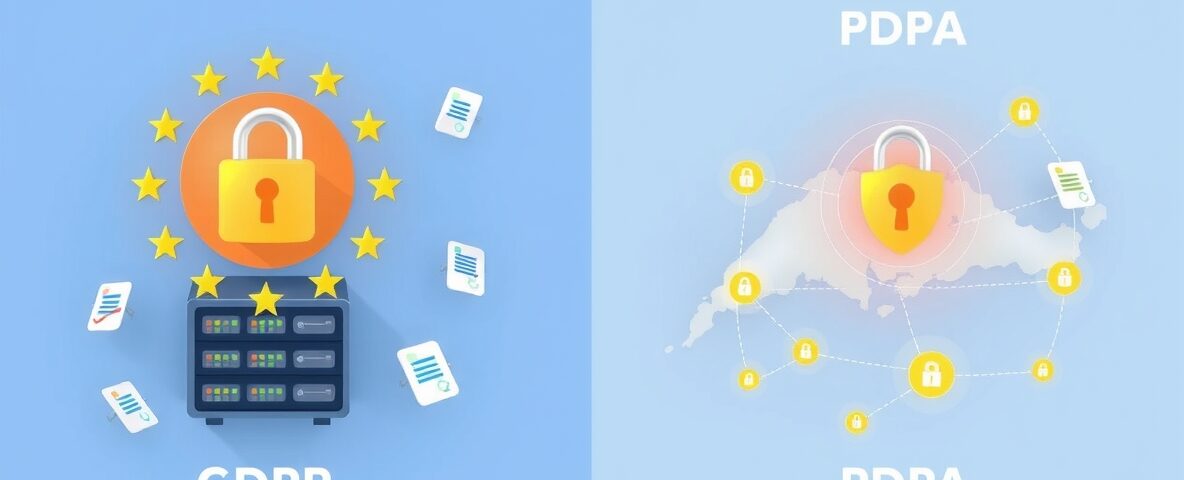
Accelerating Your Sales Pipeline with Account-Based Marketing
September 12, 2025
Performance-Driven Campaigns in Asia: The Role of Personalized Email Marketing
September 12, 2025Data protection regulations play a crucial role in safeguarding individuals’ privacy rights and ensuring responsible handling of personal data. In Singapore, two prominent frameworks governing data protection are the General Data Protection Regulation (GDPR) and the Personal Data Protection Act (PDPA). While both share similar objectives, they have distinct features and implications for businesses operating in Singapore. In this blog post, we will conduct a comparative analysis of GDPR and PDPA to shed light on their key similarities, differences, and their impact on data protection in Singapore.

-
Scope and Jurisdiction: The GDPR, implemented by the European Union (EU), has extraterritorial reach, affecting organizations that process personal data of EU residents, regardless of their physical location. On the other hand, the PDPA governs the collection, use, and disclosure of personal data in Singapore, primarily applicable to organizations operating within Singapore’s jurisdiction.
Scope and jurisdiction are crucial aspects of data protection regulations that determine the applicability and reach of the General Data Protection Regulation (GDPR) and the Personal Data Protection Act (PDPA) in Singapore. Let’s explore these concepts in more detail for each regulation:
GDPR:
-
Extraterritorial Reach: The GDPR has an extraterritorial scope, meaning it applies to organizations outside the European Union (EU) if they process personal data of individuals residing in the EU. This provision ensures that EU citizens’ data is protected, regardless of where the processing takes place.
-
EU Data Subjects: GDPR’s scope primarily revolves around protecting the personal data of EU data subjects. It applies to any organization, regardless of its location, if it processes personal data of individuals who are in the EU, irrespective of their nationality or citizenship.
-
Data Processors and Controllers: The GDPR applies to both data controllers (entities that determine the purposes and means of data processing) and data processors (entities that process data on behalf of the data controllers). Both controllers and processors must comply with the regulation’s provisions.
PDPA Singapore:
-
Jurisdiction: The PDPA is the primary data protection legislation in Singapore and has jurisdiction within the country. It governs the collection, use, and disclosure of personal data by organizations operating within Singapore, irrespective of their size or industry.
-
Singaporean Individuals: The PDPA focuses on protecting the personal data of individuals in Singapore. It applies to organizations that handle personal data of Singaporean residents, including citizens, permanent residents, and foreigners residing in the country.
-
Organizations Covered: The PDPA applies to both private sector organizations (including businesses, associations, and non-profit organizations) and public sector entities. It covers a wide range of sectors and industries, including healthcare, finance, education, telecommunications, and more.
-
Extraterritorial Application: The PDPA also has limited extraterritorial application. It can apply to organizations located outside Singapore if they collect, use, or disclose personal data in Singapore or target Singaporean individuals with their goods, services, or activities.
In summary, while the GDPR has a broader extraterritorial reach and focuses on EU data subjects’ protection, the PDPA’s jurisdiction is primarily within Singapore, safeguarding the personal data of individuals residing in the country. It is crucial for organizations operating in Singapore to comply with the PDPA’s provisions, regardless of whether they fall under the GDPR’s scope, to ensure the responsible handling and protection of personal data.

-
Consent and Legal Basis: Both GDPR and PDPA emphasize obtaining consent as a fundamental principle for lawful data processing. However, there are subtle differences. GDPR requires explicit and freely given consent, whereas PDPA allows for implied consent in certain circumstances. Additionally, GDPR introduces additional legal bases for processing personal data, such as legitimate interests and contractual necessity, while PDPA primarily relies on consent and other exceptions.
Let’s explore how consent and legal basis are addressed in both the General Data Protection Regulation (GDPR) and the Personal Data Protection Act (PDPA) in Singapore:
GDPR:
-
Consent: GDPR places a significant emphasis on obtaining valid and explicit consent from individuals before processing their personal data. Consent must be freely given, specific, informed, and unambiguous. It should be a clear affirmative action by the data subject, signifying their agreement to the processing of their data.
-
Legal Basis: In addition to consent, GDPR provides alternative legal bases for lawful data processing. These include the necessity of processing for the performance of a contract, compliance with a legal obligation, protection of vital interests, performance of a task carried out in the public interest or in the exercise of official authority, legitimate interests pursued by the data controller or a third party.
PDPA Singapore:
-
Consent: Similar to GDPR, the PDPA emphasizes the importance of obtaining consent from individuals for the collection, use, or disclosure of their personal data. However, the PDPA also recognizes the concept of implied consent in certain circumstances, such as when the consent can be reasonably inferred from the individual’s actions or the nature of the relationship between the parties.
-
Legal Basis: While consent is a primary legal basis for processing personal data under the PDPA, it also includes other legal bases such as the necessity of processing for the performance of a contract, compliance with a legal obligation, protection of vital interests, legitimate interests, and the provision of medical treatment or healthcare services.
It’s important to note that both GDPR and PDPA emphasize the need for organizations to have a legal basis for processing personal data, with consent being a common requirement. However, GDPR sets a higher threshold for obtaining consent, requiring explicit and unambiguous consent, while PDPA allows for more flexibility with the concept of implied consent in certain situations.
Organizations operating in Singapore must adhere to the requirements of the PDPA to obtain valid consent and establish a legal basis for processing personal data. They should also consider GDPR’s stricter standards for obtaining consent if they process personal data of individuals from the European Union, even if they are based in Singapore. By doing so, organizations can ensure compliance with both regulations and protect individuals’ privacy rights.
-

-
Data Subject Rights: GDPR and PDPA provide individuals with certain rights over their personal data. These rights include access, rectification, erasure, objection, and data portability. While the overall framework is similar, there may be variations in the specific requirements and procedures for exercising these rights under each regulation.

-
Data Transfer and Cross-Border Compliance: GDPR imposes strict restrictions on transferring personal data outside the EU to ensure an adequate level of protection. Organizations must rely on appropriate safeguards, such as standard contractual clauses or binding corporate rules, to facilitate lawful transfers. In contrast, PDPA allows for data transfers to countries with comparable data protection laws or under prescribed circumstances, without requiring explicit additional safeguards.

-
Penalties and Enforcement: Both GDPR and PDPA emphasize compliance and provide penalties for non-compliance. GDPR has the potential for severe fines, reaching up to €20 million or 4% of global annual turnover, whichever is higher. PDPA, while not imposing fines on non-compliant organizations, has the power to issue warnings, directions, and financial penalties for breaches of its provisions.

-
Data Protection Officers (DPOs): Under GDPR, certain organizations are mandated to appoint a Data Protection Officer responsible for ensuring compliance with the regulation. PDPA does not explicitly require the appointment of a DPO, but it encourages organizations to have a designated person responsible for data protection matters.
Conclusion: GDPR and PDPA serve as important frameworks for data protection in their respective regions. While GDPR has a broader geographical reach and imposes stringent requirements on data transfers, PDPA focuses on the specific context of Singapore. Businesses operating in Singapore need to understand the similarities and differences between these regulations to ensure compliance and effectively protect personal data. By adopting comprehensive data protection practices that align with both GDPR and PDPA, organizations can build trust, enhance customer relationships, and navigate the complex landscape of global data protection regulations successfully.
Check this out:


